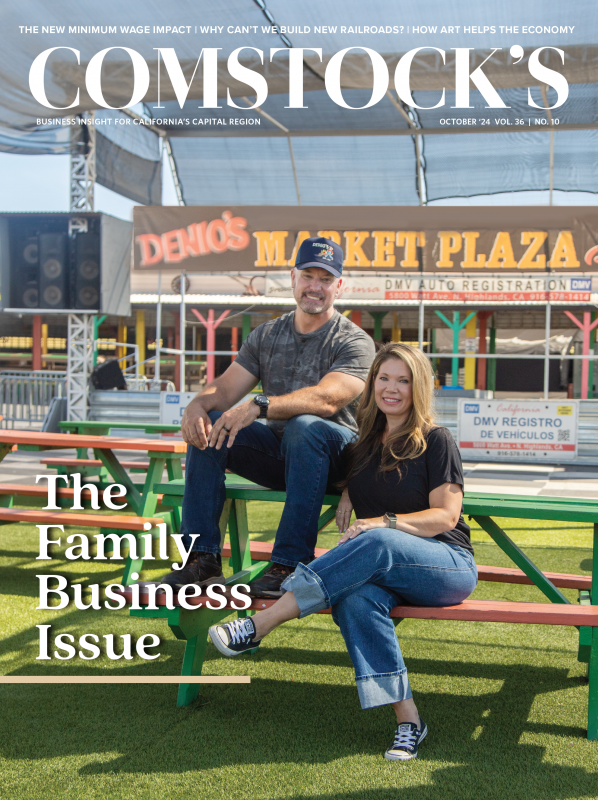When the museum received a 1906 Best 110 HP steam tractor in 2012, its arrival warranted a press release. Described as the “monarch of the fields,” it was a massive machine weighing in at 34,000 pounds with 8-foot-diameter rear wheels and a water tank that held up to 940 gallons of water. It was considered ahead of its time because of its use of a piston-type admission valve that balanced its steam pressure, allowing the tractor to move backward and forward more easily. This behemoth not only dominated the fields but was used for hauling freight and as a road engine for the logging and mining industries.
Admission is free to visit the museum, which opened in 1997. With
130,000 total square feet, it’s also a community gathering hub,
hosting events like the Young Cattlemen’s Association award
dinner, student field trips, business meetings, conferences and
festivals, as well as cultural weddings and other personal
parties.

Now it resides in tractor heaven, which, apparently, is in Woodland. Those who enter the Heidrick family’s California Agriculture Museum are greeted by aisles lined with rare antique trucks and tractors of all colors, shapes and eras, along with other artifacts depicting the country’s rich agricultural machinery history.
The museum, located in an industrial section off Interstate 5, has been a tractor lover’s paradise for almost 30 years, with exhibits tracing the late 1880s farming boom in America to the transition from horse-drawn tools to post-World-War-II-era machinery.
The museum follows the timeline of machinery taking over from the
horse, starting about 1900.

Steve Slabach, a docent at the museum for eight years, says the museum depicts many of the dramatic changes the ag industry experienced during the first 50 years of the 20th century.
“This museum is a story of machinery taking over from the horse, starting about 1900,” says Slabach. “That’s the theme here, and it really changed the face of agriculture in America. It shows the progress of machinery over that period of time and how it became more efficient.”
Woodland resident Steve Slabach has been a docent at the
California Agriculture Museum for about eight years.

Admission is free to visit the museum, and with 130,000 total square feet, it’s also a community gathering hub, hosting events such as the Young Cattlemen’s Association award dinner, student field trips, business meetings, conferences and festivals, as well as weddings and private parties like quinceañeras.
“A lot of families in Woodland are agriculture based, or are from farm families,” says Museum Director Cecilia Gonzalez, who lives in Woodland. “They grew up around tractors, and then they want to get married in front of a tractor. But we also do a lot of fundraisers, and we’re highly involved in the community.”
Charlie and Jack of Sacramento ride replica toy tractors that are
available for kids to use throughout the building.

The museum traces its beginnings to the 1930s, when farmer brothers Joe and Fred Heidrick, Sr., who specialized in restoring tractors and other farm machinery, began amassing a collection they wanted to showcase. They opened the Hays Lane facility in 1997 to display the collection, initially calling it the Heidrick Ag History Center; then in 2015, after transitioning to nonprofit status and expanding, it became the California Agriculture Museum.
One of the oldest pieces at the museum is the 1906 Best steamer,
which weighs 34,000 pounds and has 8-foot-diameter wheels.

Gonzalez says it’s hard to say exactly how many pieces of
equipment are currently displayed because they frequently change
inventory.
“The family itself has a warehouse full of more tractors,” she
says. “But I would say we have about 80 tractors in there. We
also have a couple of classic cars, trucks, wagons — not just all
tractors. We also have handheld equipment from the very early
ages of agriculture.”
Slabach, working a recent morning shift, notes the diversity of the museum, which features everything from a blacksmith shop where farm tools were “cobbled together,” he says, to giant harvesters and steam tractors, highlighting the evolution from steel wheels to rubber tires in the 1930s. The museum also has a section dedicated to the history of Caterpillar, which started as two separate California companies — Best, located in San Leandro, and Holt in Stockton.
An Oliver Hart-Parr tractor, circa 1930.

“They spent 10 years suing each other on patents, and then a financial man in San Francisco worked out a deal,” Slabach says. “In 1925 they joined together and ultimately moved their headquarters to Peoria, Illinois.”
Gonzalez says the museum accepts donations, with people regularly dropping off their old tractors and other equipment.
A Russell and Company steam tractor from around 1900.

Monarch tractors on the floor at the California Agriculture
Museum.

“We get inquiries every week,” she says, adding that volunteers are currently working on several different projects, including restoring a 1935 Ford truck. “People say, ‘I found this, and I don’t know if it’s going to be useful to your museum or if it’s up to par.’ We always have them send pictures and information and see where we can fit it in the collection.”
A popular attraction at the museum is the availability of replica toy tractors for kids to ride throughout the building, as toddlers from Sacramento, Charlie and Jack, discovered.
The museum has a section dedicated to the history of Caterpillar,
which started as two separate California companies – Best,
located in San Leandro, and Holt in Stockton. The company is
currently located in Texas.

“Jack just loves tractors; they’re his favorite thing,” says his
mother, Jayna Gritzai, while watching him peddle a green toy
tractor provided by the museum. Gritzai says they visit the
museum regularly.
“Somebody was smart enough to put this in for little kids,”
Slabach says. “They just have a wonderful time.”
Stay up to date on business in the Capital Region: Subscribe to the Comstock’s newsletter today.
Recommended For You
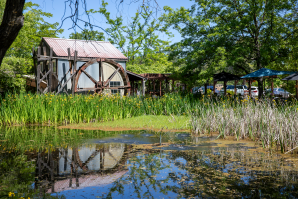
A Splendid Small-Town Getaway
Visitors can brunch, taste wine and spend the night in a pastoral paradise
The 10-acre Placer County business off Horseshoe Bar and Auburn-Folsom Road in Loomis may officially be called The Flower Farm, but it’s much more than that — historic inn, gourmet cafe, wine tasting room, gift shop, wedding and events center, nursery and citrus orchard.
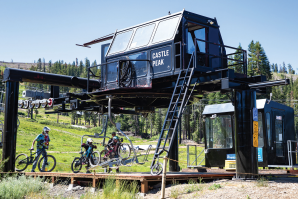
Missing Ski Season? Roll With the Pros at Woodward Tahoe
Boreal Mountain’s action sports complex offers fun for all ages and skill levels
There’s not a snowflake in sight at Boreal Mountain along Interstate 80 in Soda Springs the week before the July 4 holiday weekend, but the ski resort is still buzzing with activity.
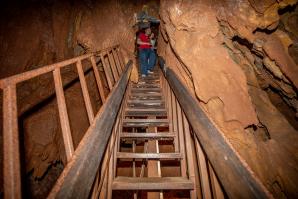
A Cool Retreat 100 Feet Below Ground
2 million-year-old Black Chasm Cavern thrills day trippers
The unassuming entrance barely hints at the secret treasures that await below. In order to access them, visitors must navigate 162 stairs in an otherworldly descent.

On a Dark Delta Highway, Ryde Hotel’s Party Legacy Endures
With all the food, fun and spirits, guests may never want to leave
The four-story Ryde Hotel, considered one of the most haunted hotels in Northern California, has been a Highway 160 art deco beacon for almost 100 years.
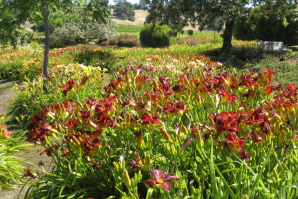
Stop and Smell the Daylilies at Amador Flower Farm
Take a break from wine tasting in the Shenandoah Valley to picnic in a garden
Nestled squarely in the midst of dozens of award-winning wineries that make Amador County’s Shenandoah Valley so unique, Amador Flower Farm in Plymouth is home to something different — an eye-popping 1,300 varieties of daylily.
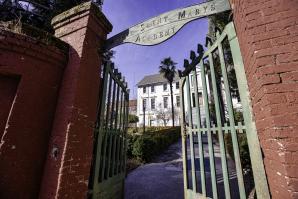
Grass Valley Museum Tells Untold History of Women During the Gold Rush
Industrious nuns, international stars and well-educated orphans
In a county known for its wealth of Gold Rush-era museums, undoubtedly some of the most compelling stories from that time reside at a former orphanage hidden within the 160-year-old walls of the Grass Valley Museum.




